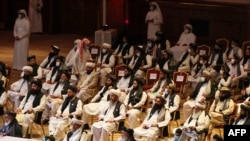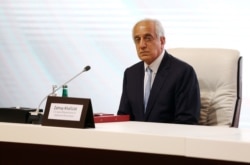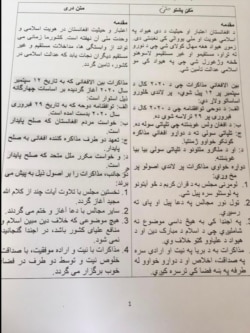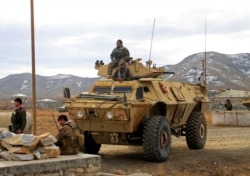Negotiation teams from the Afghan government and the Taliban have agreed to refer differences in interpretation of Sharia law to a joint committee, protect the confidentiality of ongoing peace talks, and carry out the process with “truthfulness, sincerity, and determination,” according to a code of conduct agreed upon by both sides last week.
VOA has obtained a copy of the 21-point code that was hailed as a breakthrough after nearly three months of negotiations between the two sides that officially started on September 12.
Zalmay Khalilzad, the United States special representative for Afghan reconciliation, called it a “milestone” and tweeted: “The people of #Afghanistan now expect rapid progress on a political roadmap and a ceasefire.”
The preamble of the code sets up four principles as the basis of negotiations.
The first one of them is the agreement signed on February 29, 2020, in Doha, between the United States and Taliban. The Afghan government was not a party to that deal and the government negotiation team strongly resisted its inclusion, according to sources familiar with the talks.
The Doha deal announced a timeline for withdrawal of all foreign forces from Afghanistan and release of Taliban prisoners in return for guarantees the Taliban will sever ties with groups like al-Qaida and will prevent anyone from planning or carrying out a terrorist attack on the U.S. or its allies on Afghan soil.
In the end, the U.S.-Taliban agreement was included but diluted with three other principles, all of them focusing on the demand for “durable peace.”
The rest of the document defines how the two sides will behave during the negotiation process and what issues could or could not become part of the agenda.
“The agenda will not include any subject that is against the sacred and blessed religion Islam or the interests of the country,” the code says.
Initially, the Taliban team wanted to specify the Hanafi jurisprudence, part of the Sunni school of thought in Islam, as the basis for negotiations. However, it encountered stiff resistance from the government team, which pointed out the religious diversity in Afghanistan, including Shi’ites.
“If differences emerge in the interpretation of Sharia law, a joint committee of the negotiation teams will make a decision,” the agreed code says.
Another interesting point of the code is about showing “respect for the other side” during the process. Multiple Afghan and Western sources told VOA over the last two months that when the negotiations started, the Taliban were acting like the victors and were treating the Afghan side as the losers in this conflict.
The three-page document emphasizes the need to take time, “not be in a haste” when discussing important issues, and “carefully listen to each other's statements with patience.”
It also sets down a protocol for note-taking that involves each side nominating three members to record the minutes, which then would be compared by both sides at the end of a meeting.
“The approved text of the minutes would be verified by both sides,” the document says.
The two teams also have agreed to avoid irresponsible comments in the media and to release only agreed upon statements.
“Protecting the confidentiality of the documents is essential and both sides should avoid disclosure of secrets,” the code says as it emphasizes the need to keep media and unrelated people from accessing the site of negotiations and the need to reject speculation.
“Once an issue is decided, there will be no further discussion on it. It will become part of the final agreement,” according to the document.
The code of conduct also specifies that no one other than members of the two teams will be in the room while negotiations are under way, including anyone from the host country or other countries that have facilitated the process.
The negotiations on finalizing the agenda continue at a time when Afghanistan has faced a spate of violence it has not seen for years.
“Violence, especially driven by Taliban attacks, continues to undermine the peace process and must end,” said a NATO statement issued Wednesday.
A car bomb attack on an army base Tuesday night killed two in Afghanistan’s Ghazni province. In Balkh province Wednesday, Taliban killed seven members of an anti-Taliban local force. A car bomb attack Monday in Kandahar wounded at least 35 people.
Charity organization Save the Children reported 2020 to be a “terrible year for the children of Afghanistan, nearly 1,900 of whom have been killed or maimed in the fighting.”
Meanwhile, a report published by the Cost of War project of Brown University said civilian casualties caused by airstrikes carried out by the United States and its allies have risen more than 300 percent since 2017.
The United States military Tuesday refuted as “one-sided” that report that civilian casualties caused by American and coalition airstrikes in Afghanistan had spiked to record levels. U.S. military spokesman Col. Sonny Leggett said the report “relies on disputed data and ignores civilian casualties caused by Taliban and ISIS attacks.”
“This includes ongoing Taliban use of car bombs, IEDs [improvised explosive devices], rockets and targeted killings to intimidate, harass and instill fear across Afghanistan,” he added in a written response shared with VOA via email.
The U.S. reduced its airstrikes after reaching a deal in February with the Taliban.
Even without the violence, Afghan analysts like Tareq Farhadi think the talks will take time, especially when the teams start negotiating the future form of government in Afghanistan.
The Taliban do not accept the current Afghan constitution.







